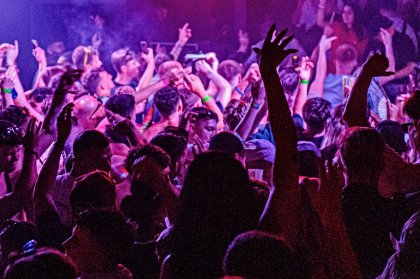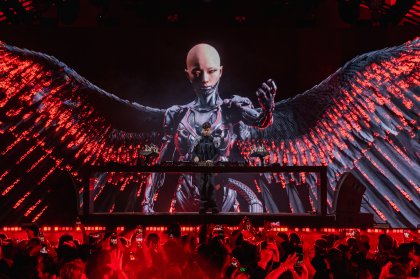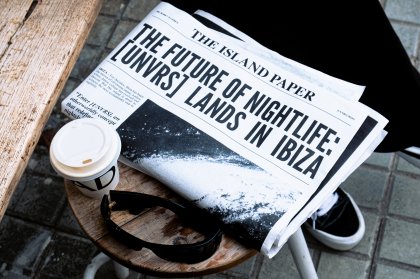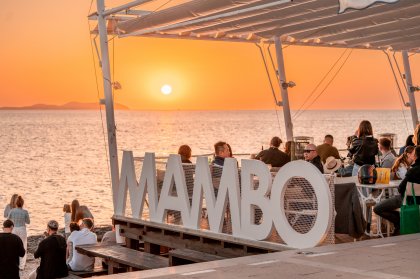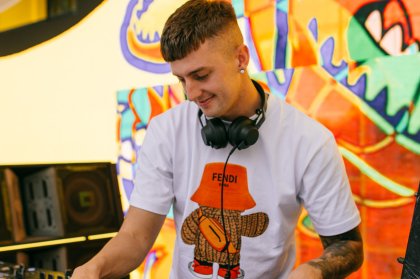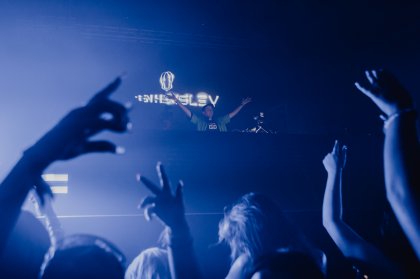Introduction
So, we're just back from Day 1 of the Ibiza International Music Summit at the Ibiza Gran Hotel in Ibiza Town, and can report nothing but positive things. Starting at 1pm and going on ‘til around 9pm the grounds of the hotel provided the perfect environment for the melting pot of creative talent to meet, greet and talk shop. 500 people, give or take, spent the entire time absorbing information and discussing various dance music related themes, ideas and problems all provided by the wide ranging personalities of the dance music industry elite. From Twitter to Cream's James Barton and Danny Tenaglia – the thoughts and ideas of people were shared.
Things all kicked off with a few customary sessions to happen each year, first up all the IMS partners got together and introduced the start of the conference, which if you don't know already is quite the lineup of influential people. You have Danny Whittle (Pacha's International Brand Director), Pete Tong (DJ, radio host), Ben Turner (Pacha Magazine Editor), Mark Netto (Pacha Programming Director), and Simeon Friend (The Shop Ibiza). Then we were taken through the business report for the dance music industry, and the consumer report. The major fact to take away from the business report was that the dance music industry is worth around 4 Billion Dollars each year, a huge amount of money and growing… So, no wonder the industry is growing as there's obviously a vast amount of business to be done and money to be made.

The consumer report was the more interesting as it provided a cool insight into the mind of the dance consumer. Research had been conducted and a major theme of the results that became apparent was that generally the genre is really popular up until a certain age and then it drops in popularity significantly. You know, whether that is because people grow out of it, have less time to go out with work and family life, or whatever; but it was clear that the industry needed to do more to have this consumer retention beyond the younger years. Pacha are fantastic advocates of this notion and actively work to do something about it – they sell branded baby clothes for example – as a brand it's much more than just a series of parties in clubs, and that helps people old and young relate to it.
It's vital brands these days that have to have a viable product to sell to remain competitive and consistent in the market, and for that product to be accessible to everyone (more on that in the section on social media). When you have acts like the Swedish House Mafia, with their ‘Take One' documentary, showing more sides to the SHM ‘brand' in this manner you can broaden your appeal to a wider audience, and prolong that appeal. Essentially the problem is all about slowing this decline in interest in dance music as people get older, and I think some bold steps have and will be taken over the coming years.
Twitter with Tatiana
At the IMS today social media and how it can benefit artists, consumers and brands was a hot top and was discussed in great detail throughout the day yesterday. Tatiana Simonian from Twitter gave a keynote introduction into the partnership between the social media network and music industry. She outlined relevant statistics and demonstrated how vital a social media such as twitter is to increasing a products reach whether that be a musician, DJ or clothing brand.
From the discussion we learnt that live tweeting is a very important way to interact with an audience and twitter has many tools that can be used to encourage consumer interaction; the hashtag feature and twitter interviews are great examples of this. Live tweeting is a huge way to increase your followers, by up to four times in fact, as it encourages people to get involved. Twitter interviews also increase user interaction and only last week Paul Van Dyk did the first ever bilingual interview on Twitter which encouraged both German and English fans to tweet direct to him.
'You are the concierge and twitter is your outlet' was the general consensus of the seminar and the way an artist can use it to express themselves and improve their reach was the main point of discussion. The idea of using a managerial team to tweet was also mentioned and from research it is clear that the DJ's and musicians who tweet themselves rather than using someone else to do so have far more followers and peaks in their tweet interaction. The EDM industry was tweeted about over 3000 times a day during Coachella and is now the fastest growing area on twitter. David Guetta has increased his followers by 3 million in the past year which is a great example of how powerful Twitter is. So, in the words of the passionate Tatiana 'The power is yours, the question is what's next?'...

Spotify conference
Will Hope the director of label relations at Spotify gave a keynote presentation on the electronic music market during the afternoon and its relationship with Spotify. How the product and market have developed and merged to form a profitable and beneficial partnership was the main focus of discussion.
Spotify is a 'complete music management platform which taps into people's passions' and holds 600 million playlists, half of which all streams come from. In 2008 Spotify launched in 7 countries and has now spread to the USA and as recent as yesterday it conquered New Zealand and Australia. So, with such a wide coverage, integration with Facebook, iTunes App, gapless playback and a radio show it seems that Spotify is quite the phenomenon. Appealing to the EDM market is one of their main aims and they have even introduced live albums which can be played back as if you were at the event; Armin van Buuren's A State of Trance 550 tour was delivered to Spotify this month live from Kiev. Spotify is also a great platform for artist promotion through their integration with other social medias such as Tumblr and Facebook. Facebook in particular feature an option to play tracks through Spotify throughout the site and especially on artist pages with what you have listened to be posted onto your timeline and newsfeeds.
Currently there are over 10 million active users and over 3 million paying subscribers of Spotify with $250 million being paid into the music industry, $180 million of which was from the last 18 months alone. The brand is obviously booming with a 200% increase in paid user rates from last year and 70% of their revenue is currently being paid back into the industry making them a hugely powerful, profitable and effective outlet and realm for artists, publishers and labels to get involved with.
Vue Cinemas: A New Touring Model?
As mentioned earlier with regard to artists making documentaries and films, there was an interesting panel from the folks at Vue Cinema's about how recorded concerts and concerts shown live in cinema's are becoming a new trend in Europe. It's an interesting thought, one that the likes of The Chemical Brothers have taken up with their ‘Don't Think' film, as it's an extra revenue stream for companies like Vue, promoters and the artists themselves, whilst providing a unique experience for the consumer. Whilst I'm not sure the concept would work in Ibiza (what with all these clubs we've got around the island) it's certainly something to consider elsewhere. If a show is sold out or otherwise unreachable by thousands of people, instead of missing out, they can experience the next best thing with a great view and perfect surround sound (unlike most gigs!) Again, it's about building the consumer audience - and this is a great way of doing it, especially when you consider that Vue has around 38 million customers per year. Not bad. If artists can create this interactive far reaching environment for consumers to engage with then the industry will only grow… and growth, handled with care, can only lead to good things.

Pete Tong interviews James Barton
Pete Tong gave the first keynote interview of IMS yesterday where he chatted with Cream founder James Barton about his recent sale of the brand to Live Nation. A very relaxed interview from the offset with Pete Tong's joker like manner taking the edge off rather gritty questions which were indeed the ones on every bodies lips...'why now?' and 'how much?'. James proudly stated that the timing was perfect for the brand and for him it had personally been 20 years of Cream so he saw it as an ideal time to move on and try something new.
It would have been foolish for the man behind Liverpool's most renowned club night and firm Ibiza staple to have sold without considering the bigger picture, although we can imagine that the pound signs must have been hard to ignore. James Barton is definitely not a foolish business man and he has not only sold his empire for a tidy sum but the unstoppable promoter has also bagged himself a new job as the president of EDM for Live Nation (a role that actually never existed before), oh and a relocation to Beverley Hills... Not too shabby!
Of course we all want to know what this means for Cream, right? Well according to Mr Barton nothing will really change, not from the day to day business anyway and with his brother Scott getting in the managing director's chair, Cream will be in good hands. Now that James has taken the move across the atlantic maybe there will be some space for Cream and Creamfields in America after-all, and this definitely seemed like a possibility as he confirmed that there is a gap in the market for more live shows.
Cream's journey to the top nearly went 'Pete Tong' a few times and James Barton isn't afraid to admit it and although he jests about the severity of debt and the failure the brand faced in the early years the reality and emotion surrounding it was obvious. With the Liverpool club losing £50,000 a week, the team falling apart and lack of focus the promoter spent several years in London working with Deconstruction. He was later drawn back to Cream and decided, along with his brother, to scrap all the gimmicks such as cheesy merchandise and focus on selling the party. Cream was 'the one that went wrong for so long' but now the brand has made a profit of almost three times what investors originally put in making their decisions to turn to Patrick Mckenna for a £5 million investment and the idea to push the business forward their best yet.

The brand couldn't be discussed without mentioning Cream's great relationship with Ibiza super-club, Amnesia. James spoke of their relationship and the amount of money that they make the club, which is obviously one of the key factors to their partnership. But after 17 years on the island he confirmed that from his knowledge most people's first experience of a Cream party has been at Amnesia. Seeing Ibiza as a 'shop window' James Barton clearly acknowledges and embraces the power the White Isle has and stated that Cream 'focuses on getting the hottest DJ's and line-ups on the island rather than spend money on circus acts'. This is probably why so many people from all around the world come to experience Cream here in Ibiza.
There is always some controversy surrounding the more commercial EDM acts such as David Guetta, The Swedish House Mafia and Deadmau5 but James Barton defended such artists, in particular Guetta by stating that there wouldn't be an EDM scene in the USA without such acts. As the co-promoter of Skrillex and being a firm believer that new acts are the 'live blood' of the business it will be exciting to see what he will bring to Live Nation and North America in his new position.
Pete Tong made a good point that 'we should be proud that a rave promotor of the 80's has now become the man who runs the EDM sector of Live Nation' and to think a few years back he was behind the decks in Liverpool club 051 DJ'ing with his top off making clubbers fear the dance-floor.
'I'm just going to go off and be the best f***ing club promoter in the world' James Barton - IMS 23/05/12
Band and Brand conference - Casy Study: Professor Green
This conference doesn't usually have the artist or acts that the case study is based on present but this year Professor Green aka. Stephen Manderson joined his management team (Ged Malone and Simon Burke), EMI man Bob Workman, Puma representative Lisa Lindahl and O2 representative Jasmine Skee on the panel to discuss 'band and brand'.
The conferences main aim was to establish whether artists are happy to work with brands and what does it actually do to help their careers. Professor Green started his career when he was signed to Mike Skinner of The Streets' record label and soon became the face of Reebok with a huge partnership. However now the Hackney rapper has turned down deals with various brands and for the past 18 months has strongly endorsed Puma sportswear whilst working closely with O2 and future deals with Mercedes and other plush brands. We wonder how much being a commercially unstoppable force actually benefits the artist and how being 'the face' of a brand helps with their career? From yesterday afternoon's seminar it was clear that both the Professor Green team and the brands in question deem their partnerships as hugely beneficial business relationships to both sides involved.
Social media outlets such as Twitter came into the discussion and as an active user of the site, Professor Green sees that it has a massive part of building and helping any brand partnerships, as the artist has direct contact with the target demographic group in which the particular brand wants to target. Throughout the talk the idea of engagement being a dual strategy that is powerful and effective between both the artist and brand was emphasised; Professor Green explained a few occasions when his partnerships allowed him to do things that he may not of done before. Through his partnership with Puma he was able to offer a free, small and intimate gig to a few lucky people in Manchester and his work with O2 has meant that his audience and fans have been rewarded with exclusive footage from his most recent Brixton Academy gig.
One topic from the conference which jumped out was the idea that record labels are possibly getting smaller whereas brands are going from strength to strength which poses the question, could they possibly take over imprints and offer artists a more unique and beneficial working relationship? This suggestion wasn't dismissed by the panel but the idea of A&R being absent through brand and band partnerships could be either an appealing or frightening prospect for artists.
The case study of Professor Green strongly highlighted that those partnerships between a brand and an artist can be hugely beneficial to both parties, and even on an equal scale. With regular correspondence and focussed direction the uniting of an artist with a suitable brand seems like not only an obvious idea but also an tactical one.

How to break it and make it.
This was a big panel moderated by a pretty decent Roger Federer look alike (actually Bobby Simms of Exploding Plastic). Panelists included Luciano, Andrea Oliva, Clark Warner from Beatport, Eruk Hofstater from Coca-Cola, Nick DeCosemo the Mixmag Editor, Nina Kraviz, Porter Robinson and others. Essentially an opportunity for them all to share their beliefs on how up-coming artists can break it and make it in the dance music industry.
Everyone gave top tips… Nina – 'You must love what you do, wholeheartedly.' Clark – 'Whatever you do with technology, social media etc, own your voice and your sound.' Andrea – 'Create your own unique sound. Don't believe the hype.' James – 'Don't be afraid to start small, a sold out show, no matter the size, is good.' Luciano – 'Believe in what you do! Go for it!' Erik – 'Continue with the progression.' Porter – 'Do precisely what it is you love. Don't fake it.' And finally Nick – 'Be lucky!' Solid advice.
Nina Kraviz was typically deep about the whole thing, saying that you must have talent initially, as without it there is nothing you can do. You must have something essential, unique or outstanding… She wondered if it must come from some form of emotion deep inside? Beats with feelings sound good. She did make a good point that success is all a mater of opinion. Commercial success is 20 million fans, millions of sales etc, whereas underground success is packing out a 200 capacity club… It all boils down to you having belief in yourself and putting that message across. There were of course other opinions, based loosely around the idea that you should work at it as it won't come easily, drop in demo's, have a personality, and take advantage of those around you for help and guidance.
There was a great discussion based on how artists can get involved with brands, as discussed with the Professor Green panel. They can help support the music the artist creates, create collaborations with a long-term vision to benefit everyone. Although of course in the short-term you can do sponsorship's with brands which is almost standard. Brands can benefit by the knowledge of young people and new innovative ways of getting that message across, like with major IMS sponsor Burn Studios - they want to offer opportunities to upcoming artists and so created a residency project which gave 11 people a chance to DJ all season in places like Privilege and Mambo's – ensuring artists can make it in their own way, but with the support of brands.
Danny Tenaglia In Conversation.
The first day of the Ibiza IMS was rounded off in spectacular style as Ben Turner and Pete Tong took an hour to speak with dance music legend Danny Tenaglia. Danny had just recently announced he was ‘retiring' from dance music, and obviously as a hugely influencial man there was a huge amount of talk about what was going through his mind… It's probably best for us to wait until the video of the interview is released by IMS for everyone who wasn't there to fully appreciate his feelings on the whole thing. But suffice to say it's been a long time coming, and is mostly down to him being tired of how the scene is today, missing his family and friends and things like that. The important thing to note is that Danny has admitted what he actually meant was that he was taking a break from the scene, with the intention of coming back with a revised method of being involved – less gigs, possibly starting a DJ school, and take things back to the days of proper club residencies and 20 hour sets. We're in to that! It all finished with a very nice tour by Danny himself of his famous loft, and things were really upbeat by this point, so the future is looking much brighter for Danny than we all thought.
Here's to day 2 of the IMS – look forward to our report afterwards!
